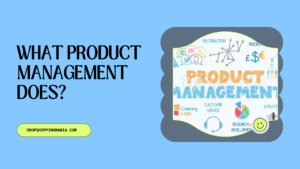Product Management

Product management is one of the crucial roles in any organization. It involves managing the development and life cycle of a product from conception to launch and beyond. It requires a unique set of skills, ranging from innovation and creativity, to problem-solving and decision-making. Product managers have the difficult job of balancing customer needs with business objectives, while ensuring their products are marketable, profitable, and able to stand out in the marketplace. further In this blog post, we will explore what product management entails, why it is important for any organization to have an effective product manager, and some tips on how to be successful in this role.
What product management does?

Product management is responsible for the strategy, roadmap, and features of a product. They work with cross-functional teams including engineering, design, marketing, and sales to bring a product to market.
In addition, product managers are responsible for the vision and execution of a product. They work with cross-functional teams to take a product from idea to launch. A successful product manager understands the market, the customer, and the competition. They use this knowledge to build a product that meets the needs of the customer and solves a problem in the market.
Product managers are also responsible for creating and maintaining a product roadmap. The roadmap is a document that outlines the timeline and milestones for a product. It includes information about upcoming features, releases, and other important events. The roadmap is used by the entire team to align on priorities and stay focused on delivering value to the customer.
A successful product manager is able to balance the needs of multiple stakeholders while staying focused on the overall goal of delivering value to the customer. They have a deep understanding of their users and what they need from a product. Product managers use this knowledge to guide the development of products that solve real problems for users.
What are the 3 major areas of product management?

The three major areas of product management are:
1. Product strategy: This is the high-level planning that goes into deciding what products to create, who they are for, and how to position and sell them.
2. Product development: This is the process of designing, building, and testing new products to ensure they meet the needs of users and customers.
3. Product marketing: This is the process of promoting and selling products to customers. It includes everything from market research and product positioning to advertising and sales enablement.
What are top 3 skills for a product manager?
A product manager is responsible for the strategy, roadmap, and features of a product. They work with cross-functional teams to bring a product to market. A successful product manager has a deep understanding of the customer, the market, and the competitive landscape. They are able to articulate the vision for a product and align stakeholders around that vision.
Top skills for a product manager:
1. Customer insight: A successful product manager has a deep understanding of the customer. They know what the customer wants and needs from a product. They are able to identify unmet needs and develop solutions to address them.
2. Market knowledge: A successful product manager understands the market in which their product competes. They keep up with industry trends and understand how their product fits into the larger landscape. They know who their competitors are and what they are offering.
3. Cross-functional collaboration: A successful product manager is able to work with multiple teams to bring a product to market. They understand the various roles within a company and how those roles contribute to bringing a product to life. Moreover, They are able to lead and motivate team members towards a common goal
What is the role of a product manager?
In general, product managers are responsible for the product planning and execution throughout the product life cycle, including:
-Defining the product strategy
-Gathering and prioritizing requirements for the product
-Coordinating with cross-functional teams to ensure timely delivery of features
-Working with marketing, sales, and support to ensure customer satisfaction
-Ensuring that the product meets quality standards
-Analyzing market trends and competitor products to determine areas of opportunity or potential threat
-Creating detailed product roadmaps to guide development efforts
-Driving achievement of key business objectives for assigned products
Is MBA needed for product management?

Product management is a process that includes the strategic planning, development, and commercialization of a product. The role of product management has evolved over time and now encompasses a wide range of responsibilities, from market research and analysis to product lifecycle management and go-to-market strategy. While an MBA is not required for product management, it can be helpful in developing the skills needed to be successful in this field.
Further, An MBA can provide product managers with the ability to think strategically about the products they are responsible for developing and commercializing. In addition, an MBA can give product managers the tools they need to effectively manage a product’s life cycle, from conception to launch to post-launch analysis. Additionally, an MBA can provide insights into go-to-market strategy and how to position products in the marketplace.
While an MBA is not required for product management, it can be helpful in developing the skills needed to be successful in this field. Moreover, If you are considering pursuing a career in product management, an MBA may give you the edge you need to succeed.
What are the 5 P's of product management?
The 5 P’s of product management are Product, Price, Placement, Promotion, and People.
Product: The first P is product. A product manager is responsible for the strategy and roadmap for a product. They work with stakeholders to understand the market and user needs and requirements. They also work with engineering to ensure that the product meets those needs and requirements.
Price: The second P is price. A product manager is responsible for pricing strategy and maximizing revenue for a product. They work with finance to understand the cost of goods and develop pricing models that will generate the desired revenue.
Placement: The third P is placement. A product manager is responsible for getting the product in front of users. They work with marketing to develop launch plans and go-to-market strategies. They also work with sales to ensure that the product is available in the right channels.
Promotion: The fourth P is promotion. A product manager is responsible for creating awareness and demand for a product. They work with marketing to develop campaigns and create collateral. They also work with PR to get media coverage for a product launch or new features/functionality.
People: The fifth P is people. A product manager is responsible for building and managing a team of cross-functional experts who are dedicated to a product’s success. They work with HR to recruit, onboard, and train new team members. They also manage performance and development for their team members
What is the hardest part of product management?

Product management is a hot topic these days. But what is it, really? And what is the hardest part of product management?
There is no one answer to these questions, as product management can mean different things to different people and organizations. However, there are some common themes that tend to crop up when discussing the difficulties of product management.
One of the hardest parts of product management is managing stakeholders. Stakeholders are individuals or groups with a vested interest in the success or failure of your product. They can be internal (e.g., colleagues, upper management) or external (e.g., customers, partners).
A successful product manager needs to be able to manage the expectations of all stakeholders while also keeping the big picture in mind. This can be a difficult balancing act, as stakeholders often have conflicting goals and objectives.
Another difficulty faced by product managers is scope creep. Scope creep occurs when the scope of a project gradually expands beyond its original boundaries. This can happen for a variety of reasons, such as changes in customer requirements or new features being added during development.
Scope creep can be detrimental to a project, as it can lead to cost overruns and schedule delays. It’s important for product managers to keep a close eye on scope creep and prevent it from happening whenever possible.
Finally, another common challenge faced by product managers is dealing with uncertainty. The world of technology is constantly changing, which means that products are constantly evolving
Do product managers own P&L?
Product managers are responsible for the profitability of their product. They own the P&L for their product and are accountable for ensuring that their product is profitable. Product managers need to be able to understand and manage the financial aspects of their product in order to be successful.
Which degree is best for product manager?

Moreover, there are a few different types of degrees that can help you become a product manager. A business degree is always a good option, as it will give you the basics in business and management. However, if you want to specialize in product management, there are a few other options to consider.
A degree in industrial engineering or management science is a great choice for those looking to go into product management. These programs will teach you about production processes and how to manage them effectively. You’ll also learn about quality control and how to ensure that products meet customer expectations.
Another option is to get a degree in marketing. This will give you the skills you need to understand customer needs and wants, and develop marketing strategies to promote products. You’ll also learn about market research and analysis, which are essential for any product manager.
Lastly, No matter which degree you choose, make sure it’s from an accredited institution and that it has a good reputation. further , this will help you get your foot in the door at top companies and position yourself for success in the field of product management.


